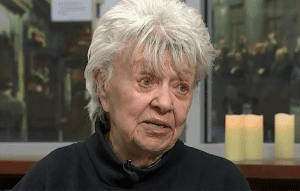Irene Zisblatt, the sole Holocaust survivor in her family of 40, will speak via livestream Thursday, Nov. 7, at 5 p.m. in the Nott Memorial.
Her talk, part of a Kristallnacht commemoration, is free and open to the public.
It is organized by Chabad at Union and co-sponsored by Alpha Phi Omega, Chi Psi, Delta Phi Epsilon, the Department of History, the Department of Political Science, Gamma Phi Beta, Hillel, the Office of Religious and Spiritual Life, the Religious Studies Program, Sigma Chi, Sigma Delta Tau and Sigma Phi.
Born in 1929 in Polyana, Ukraine (in what is now Zakarpattia Oblast), Zisblatt was sent to the Auschwitz-Birkenau concentration camp at 14. There she endured unimaginable brutality and the inhumane medical experiments of Josef Mengele, the notorious Nazi physician known as “angel of death.”
Her story of unyielding courage was later featured in the 1998 Academy Award-winning documentary, “The Last Days,” produced by Steven Spielberg.
This year marks the 86th anniversary of Kristallnacht (the Night of Broken Glass), considered by many to be the start of the Holocaust. The pogrom refers to Nov. 9-10, 1938, when German Nazi paramilitary forces attacked Jewish individuals and their property in a widespread campaign of hatred and violence. Smashed glass was strewn on the streets from the windows of looted and vandalized shops and synagogues. World War II broke out a year later when Germany invaded Poland.
The Nazi genocide killed six million Jews across Nazi Germany-occupied Europe.
“With antisemitic incidents surging all over the world, our Kristallnacht commemoration offers a unique and critical opportunity to hear from a survivor who witnessed history’s darkest hour and understands the importance of acting against hatred, violence and indifference,” said Laiky Rubin, adviser to Chabad.
“Irene Zisblatt’s story is a testament to the strength of the human soul. We hope for an evening of inspiration, remembrance and celebration of the indomitable human spirit.”
Stephen Berk, the Henry and Sally Schaffer Professor of Holocaust and Jewish Studies, will be on hand to give opening remarks to those gathered in the Nott.
The Zisblatt family’s persecution begins before they were sent to Auschwitz. In 1939, young Irene was expelled from school when Jews were forbidden to leave their houses in the early morning and evening. In 1944, she and her family were sent to the crowded ghetto of Munkács, where they lived in a small tent they built from tablecloths.
In Auschwitz, Zisblatt was immediately separated from her family, including her parents, four younger brothers and a younger sister, all of whom were exterminated at Gas Chamber #2. With the help of another prisoner, she escaped on a train that took her to the Neuengamme concentration camp in Hamburg, Germany; shortly afterward, she was forced to go on a death march as the war wound down.
Zisblatt and her friend managed to flee at night as they stood between two forests. The next day, they were rescued by American soldiers, but her friend died from disease a day later. Zisblatt was adopted by an American family two years later.
Zisblatt now lives in Broward County, Florida. She has a son, a daughter and five grandchildren. She frequently visits American schools to educate children about her Holocaust experiences in an effort to eradicate intolerance and prejudice. She published her autobiography, “The Fifth Diamond,” in 2008.
